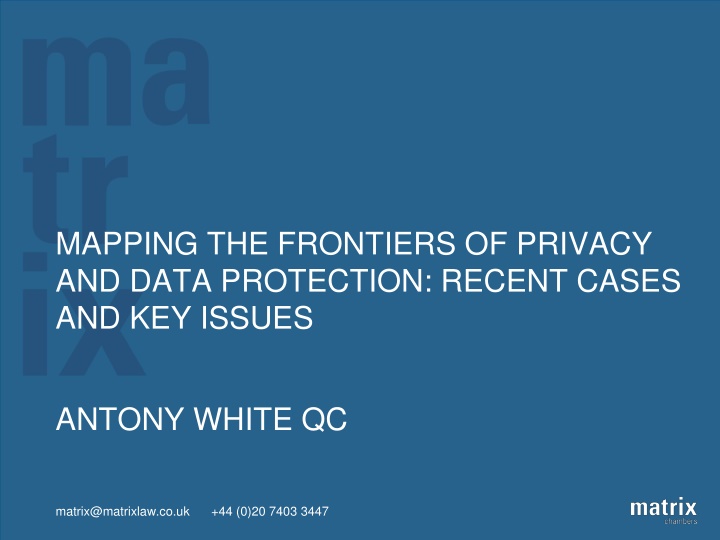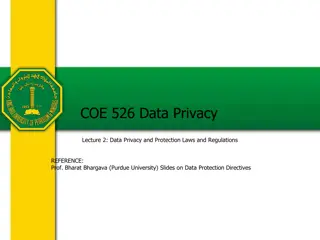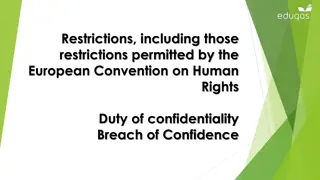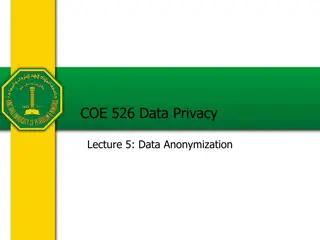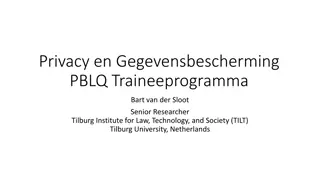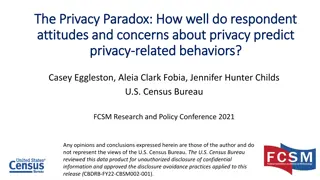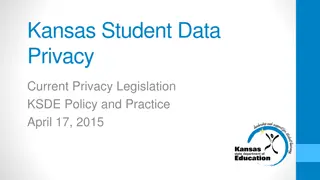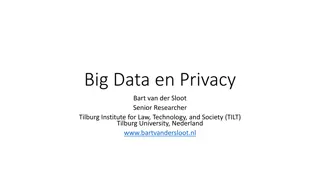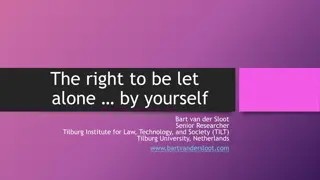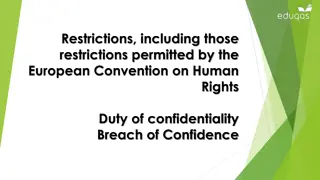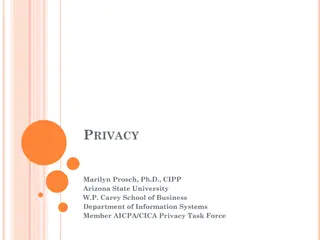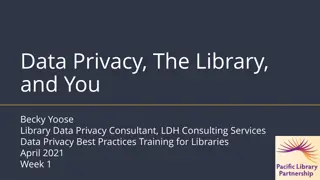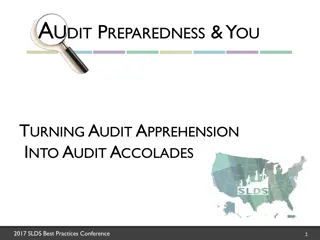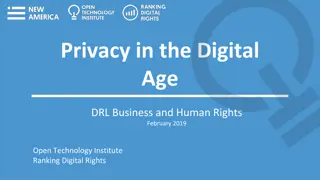Recent Cases and Key Issues in Privacy and Data Protection
Recent cases and key issues in privacy and data protection are discussed in relation to criminal investigations and judicial responses. The Leveson Inquiry Report, judicial considerations, and the importance of safeguarding individuals' rights under Article 8 are highlighted. Attention is drawn to the delicate balance between public interest and personal privacy, emphasizing the need for careful handling of information by law enforcement agencies and the media.
Download Presentation

Please find below an Image/Link to download the presentation.
The content on the website is provided AS IS for your information and personal use only. It may not be sold, licensed, or shared on other websites without obtaining consent from the author.If you encounter any issues during the download, it is possible that the publisher has removed the file from their server.
You are allowed to download the files provided on this website for personal or commercial use, subject to the condition that they are used lawfully. All files are the property of their respective owners.
The content on the website is provided AS IS for your information and personal use only. It may not be sold, licensed, or shared on other websites without obtaining consent from the author.
E N D
Presentation Transcript
MAPPING THE FRONTIERS OF PRIVACY AND DATA PROTECTION: RECENT CASES AND KEY ISSUES ANTONY WHITE QC matrix@matrixlaw.co.uk +44 (0)20 7403 3447
ARTICLE 8 RIGHTS IN RELATION TO CRIMINAL INVESTIGATIONS Leveson Inquiry Report Volume II Part G Chapter 3 para 2.39 Judicial Response to Law Commission Consultation Paper 209 College of Policing Guidance on Relationships with the Media Hannon and Dufour v News Group Newspapers [2015] EMLR 1 PNM v Times Newspapers Ltd [2014] EMLR 30 ERY v Associated Newspapers Ltd [2017] EMLR 9 ZXC v Bloomberg LP [2017] EMLR 21 TKR v BBC NIQB/NICA Khuja v Times Newspapers Ltd and ors [2017] 3 WLR 351 Richard v BBC [2018] EMLR 26 matrix@matrixlaw.co.uk +44 (0)20 7403 3447
LEVESON INQUIRY REPORT - VOLUME II PART G CHAPTER 3 PARA 2.39 Police forces must weigh very carefully the public interest considerations of taking the media on police operations against the Article 8 and Article 6 rights of the individuals who are the subject of such an operation. Forces must also have directly in mind any potential consequential impact on the victims in such cases. More generally, I think that the current guidance in this area needs to be strengthened. For example, I think that it should be made abundantly clear that save in exceptional and clearly identified circumstances (for example, where there may be an immediate risk to the public), the names or identifying details of those who are arrested or suspected of a crime should not be released to the press nor the public. (emphasis added) matrix@matrixlaw.co.uk +44 (0)20 7403 3447
JUDICIAL RESPONSE TO LAW COMMISSION CONSULTATION PAPER 209 4/3/13 - TREACY LJ AND TUGENDHAT J (AND OTHER SENIOR JUDGES) A decision by the police to publish the name of a person arrested must be made after consideration of the rights of such persons, including their rights under ECHR Art 8, on a case by case basis. The police arrest many people who are never charged. If there were a policy that the police should consistently publish the fact that a person has been arrested, in many cases that information would attract substantial publicity, causing irremediable damage to the person s reputation. Even if the fact that the person was not charged were subsequently published, that would not receive the same publicity, and would not prevent subsequent internet searches disclosing that the person had been arrested. We adopt the words of Leveson LJ: it should be made abundantly clear that save in exceptional and clearly identified circumstances (for example, where there may be an immediate risk to the public), the names or identifying details of those who are arrested or suspected of a crime should not be released to the press nor the public. matrix@matrixlaw.co.uk +44 (0)20 7403 3447
COLLEGE OF POLICING GUIDANCE ON RELATIONSHIPS WITH THE MEDIA MAY 2013 - PARA 3.5.2 Police forces must balance an individual s right to respect for a private and family life, the rights of publishers to freedom of expression and the rights of defendants to a fair trial. Decisions must be made on a case-by-case basis but, save in clearly identified circumstances, or where legal restrictions apply, the names or identifying details of those who are arrested or suspected of a crime should not be released by police forces to the press or the public. Such circumstances include a threat to life, the prevention or detection of crime or a matter of public interest and confidence. This approach aims to support consistency and avoid undesirable variance which can confuse press and public. matrix@matrixlaw.co.uk +44 (0)20 7403 3447
HANNON AND DUFOUR V NEWS GROUP NEWSPAPERS [2015] EMLR 1 Mann J considered the privacy rights of arrested persons in some detail at [83] to [96], and rejected a submission that there could be no reasonable expectation of privacy in the fact of an arrest. After referring to the Leveson Inquiry report at [93] and the Judicial Response published by Treacy LJ and Tugendhat J at [94]-[95], Mann J concluded at [96] that there can be reasonable expectation of privacy in relation to the fact of an arrest:- For present purposes it is sufficient for me to observe that the key authority relied on by Mr White (Axel Springer) does not support an absolute right of the press to have, and to publish, the fact of an arrest, and its circumstances. At most it supports a submission that, if the facts justify it, that right exists and the countervailing privacy rights do not. As with a large number of disputes under Convention rights, that is a question of fact and degree, and is highly fact sensitive. [96] matrix@matrixlaw.co.uk +44 (0)20 7403 3447
PNM V TIMES NEWSPAPERS LTD [2014] EMLR 30 CA PNM who had been arrested but not charged was subsequently named in open court at the criminal trial of others. His application for an injunction to restrain publication of the fact of his arrest failed because the right of the press to report what had been said in open court should prevail. See [41]-[42]:- Mr Barca has also drawn our attention to some recent material, which considers whether the police should publish the name of someone who has simply been arrested. I accept this material provides some support for the proposition that there should be a more careful consideration of such a person's rights than there might have been in the past [PNM] is not, however, someone who has simply been arrested. The fact of his arrest and other associated information extensively referred to in open court, including in public rulings given at the criminal trial, Respondents want to report this. It was this which gave rise to the many factors engaged which the judge correctly identified and carefully considered. has been the and bearing on the rights matrix@matrixlaw.co.uk +44 (0)20 7403 3447
ERY V ASSOCIATED NEWSPAPERS LTD [2017] EMLR 9 Nicol J held that the claimant had a reasonable expectation of privacy in relation to the fact that he was under investigation by the police (on the basis that it had been conceded that he had a reasonable expectation of privacy in the fact that he had been interviewed under caution), even though he had not been arrested. After referring to the Leveson Inquiry report, the College of Policing Guidance, Hannon and Dufour v NGN, and PNM v Times Newspapers Ltd, Nicol J accepted the submission (recorded by him at [60]) that it would be anomalous if a person who had been arrested would usually have a reasonable expectation of privacy in that information while a person, whose investigation had not reached even that stage, did not. However, note that the judgment distinguishes at [71(iv)] between publication (restrained) and further investigation (not restrained). matrix@matrixlaw.co.uk +44 (0)20 7403 3447
ZXC V BLOOMBERG LP [2017] EMLR 21 Garnham J held that an individual's right to privacy had been engaged by the publication in a news article of information obtained from a confidential law enforcement agency document that he was part of an investigation into bribery and corruption. However, the publisher's right to freedom of expression outweighed the individual's right to privacy as the inclusion of the individual's name in the article had been a legitimate journalistic decision, it had not been suggested that he was guilty of an offence and the information was already in the public domain. Trial heard before Nicklin J judgment awaited. matrix@matrixlaw.co.uk +44 (0)20 7403 3447
AJS V NEWS GROUP NEWSPAPERS (UNREPORTED, 10/3/17) Nicol J granted an interim non-disclosure injunction in the context of a criminal investigation. There is no publicly available judgment but it is understood that the injunction restrained disclosure of the arrest of a person other than the Claimant arising out of an incident in the Claimant s home. Nicol J held that there was a reasonable expectation of privacy and that the Claimant s Article 8 rights were not outweighed by the Defendant s Article 10 rights. matrix@matrixlaw.co.uk +44 (0)20 7403 3447
TKR V BBC NIQB JACKSON V BBC NICA In November 2016 an application for a privacy injunction brought by two Northern Ireland rugby stars to restrain further publication of information about their arrest for alleged sexual offences was dismissed by the NIQB. The Judge held that their Article 8 rights were engaged but outweighed by the defendant s Article 10 rights, in particular because of the public interest in knowing why they had been left out of the NI squad due to play an important match in the USA. However, reporting restrictions were imposed which had the effect of preventing further press reporting. In June 2017 the NICA discharged the reporting restrictions and the criminal proceedings against the two players (who have since been acquitted) were the subject of further media reporting. matrix@matrixlaw.co.uk +44 (0)20 7403 3447
GIESBERT V FRANCE [2017] ECHR 504 The Strasbourg Court found no breach of Article 10 where a magazine was held liable in damages for publishing information taken from prosecution documents in ongoing criminal proceedings. However, the focus was on the Article 6 rights of the Claimants, not their Article 8 rights. matrix@matrixlaw.co.uk +44 (0)20 7403 3447
KHUJA V TIMES NEWSPAPERS LTD & ORS [2017] 3 WLR 351 The Supreme Court by a majority of 5:2 dismissed the Claimant s appeal against the decision of Tugendhat J and the CA to refuse an injunction restraining publication of his identity and information about his arrest which emerged in open court in criminal proceedings see PNM v Times Newspapers Ltd [2014] EMLR 30 CA above. Campbell v MGN Ltd effectively recognised a qualified common law right of privacy, engaged if in respect of the disclosed facts the person in question had a reasonable expectation of privacy: [21]. Once the court is satisfied that that right is engaged, it must be balanced against a public interest in freedom of the press: [22]. Matters which were discussed at a public trial are not matters in respect of which the Claimant can have had any reasonable expectation of privacy: [34(1)]. matrix@matrixlaw.co.uk +44 (0)20 7403 3447
KHUJA V TIMES NEWSPAPERS LTD & ORS CONTD (1) C s Article 8 rights could still be engaged because of the impact which publication would have on his relations with his family and the community in which he lives: [34(2)]. However, balancing C s Article 8 rights against the right of the press to publish proceedings in open court, the courts cannot depart from principles governing prior restraint of media publication accepted at common law in the areas of contempt and defamation, reflected in a substantial body of statute law as well as in the jurisprudence on article 10: [23]. In defamation no injunction would be granted preventing publication of a fair and accurate report of what was said in court. It would be both privileged and justified. incoherent for the law to refuse an injunction to prevent damage to C s reputation directly, while granting it to prevent collateral impact on his family life in the same circumstances : [34(3)]. matrix@matrixlaw.co.uk +44 (0)20 7403 3447
KHUJA V TIMES NEWSPAPERS LTD & ORS CONTD (2) The majority treated the case as an open justice case, holding that the press freedom to report what was said in open court outweighed the limited privacy interests of the claimant. The minority Lords Kerr and Wilson) took a different approach, and cited with approval the Leveson Report, the Judicial Response to the Law Commission and other materials including Canadian cases contributing to a developing jurisprudence on the privacy rights of arrested persons. At [49] they summarised the various materials surveyed, observing:- Plainly there is increasing concern, judicial and extra-judicial, about the effect upon an innocent person s reputation of publication of the fact of his arrest. matrix@matrixlaw.co.uk +44 (0)20 7403 3447
RICHARD V BBC [2018] EMLR 26 Reasonable expectation of privacy as a matter of general principle . Art 8/10 balance. Public interest in progress of police investigation, but not in identifying individual/s concerned. matrix@matrixlaw.co.uk +44 (0)20 7403 3447
ARTICLE 8 AND FAMILY LIFE R (Countryside Alliance and ors) v AG [2008] 1 AC 719 Weller v Associated Newspapers Ltd [2016] 1 WLR 1541 OPO v MLA [2015] EMLR 4 Local Authority X v HI and ors [2017] 1 FLR 1362 JR20 v Facebook Ireland [2017] NICA 48 Ali & Aslam v Channel 5 [2018] EMLR 17 (CA judgment awaited) matrix@matrixlaw.co.uk +44 (0)20 7403 3447
R (COUNTRYSIDE ALLIANCE AND ORS) V AG [2008] 1 AC 719 AT [116] Article 8, it seems to me, reflects two separate but related fundamental values. The other is the inviolability of a different kind of space, the personal and psychological space within which each individual develops his or her own sense of self and relationships with other people. This is fundamentally what families are for and why democracies value family life so highly. Families are subversive. They nurture individuality and difference. Article 8 protects the private space, both physical and psychological, within which individuals can develop and relate to others around them. But that falls some way short of protecting everything they might want to do even in that private space; and it certainly does not protect things that they can only do by leaving it and engaging in a very public gathering and activity. (emphasis added) matrix@matrixlaw.co.uk +44 (0)20 7403 3447
WELLER V ASSOCIATED NEWSPAPERS LTD [2016] 1 WLR 1541 CA Accepts that the effect of the Strasbourg jurisprudence (in particular Reklos v Greece [2009] EMLR at [37], [40]) is to exclude the protection of Article 8 where a photograph of an adult (or even a child) is taken in the context of an activity that is likely to be recorded or reported in a public manner: [27]. However reasonable expectation of privacy upheld in relation to photographs taken of children on a family shopping trip in Los Angeles because of: (i) the family activity or family element ([61]), (ii) the fact that the Claimants parents did not consent to the taking or publication of the photographs ([62]), (iii) the critical factor that the Claimants were children and were identified by their surname ([63]), and (iv) the impact of the publication on the Claimants ([64]-[65]). matrix@matrixlaw.co.uk +44 (0)20 7403 3447
BOGOMOLOVA V. RUSSIA (APPLICATION NO. 13812/09) 20 JUNE 2017 Violation of Article 8 rights upheld when a photograph of a six year old boy taken in a public place with his mother s consent and later posted on the internet was used without her consent to illustrate the cover of a pamphlet published by an adoption agency. The ECtHR focused on two points in reaching this conclusion. First, although the photograph had been taken with the mother s consent, she had not authorised the use and publication of the photograph by the adoption agency: [56]. Secondly, the publication of the photograph impliedly and falsely suggested the boy was an orphan:- the present case concerns the publication of a photograph which, at least by inference, can be seen to suggest that the applicant s son was an orphan. Consequently, the impugned publication could have given its readers the false impression that the applicant s son had no parents or that his parents had abandoned him. Any of these or other similar false impressions could prejudice the public perception of the family bond and relations between the applicant and her son. [57] matrix@matrixlaw.co.uk +44 (0)20 7403 3447
OPO V MLA [2015] EMLR 4 CA At [45] Arden LJ explained that it is not the law that a person can sue for misuse of private information whenever his family life was affected even if the information does not belong to him . The rejection by the Court of Appeal of the claim based on misuse of private information in OPO v MLA was unaffected by the subsequent appeal to the Supreme Court: [2016] AC 219. matrix@matrixlaw.co.uk +44 (0)20 7403 3447
LOCAL AUTHORITY X V HI AND ORS [2017] 1 FLR 1362 Roberts J held that private information disclosed by a vulnerable minor to professionals involved in his care should not be disclosed to his father and stepmother who were involved in care proceedings where the minor was the subject. The information was of limited relevance to the issues in the proceedings and the minor s Article 8 rights outweighed the parents Article 6 rights. matrix@matrixlaw.co.uk +44 (0)20 7403 3447
JR20 V FACEBOOK IRELAND [2017] NICA 48 Facebook found liable at first instance for misuse of private information for failing to remove postings referring to the religion of the Plaintiff s grown-up children: [2016] NIQB 98. NICA overturned this finding, holding that in general there is nothing private about a person s identity, appearance or religion:- A person's identity and appearance are unlikely to be capable of misuse in the context of the tort because as a matter of everyday occurrence people engaging with the person will be aware of those factors. There is private about them. The same may also be true of a person's religion. Many religious people engage in regular acts of worship in the company of large numbers of worshippers of a similar persuasion. Where publication of the fact that the person adheres to that religion would almost invariably not Whether or not to disclose one s religious persuasion, if any, is a matter for the aspect of personal autonomy. [34] nothing that be private information. is the case the person holding that opinion. That is an matrix@matrixlaw.co.uk +44 (0)20 7403 3447
ALI & ASLAM V CHANNEL 5 [2018] EMLR 17 Claim for misuse of private information arising out of inclusion of filming of eviction in documentary TV programme about debt and evictions upheld by Arnold J. CA judgment awaited. matrix@matrixlaw.co.uk +44 (0)20 7403 3447
LIABILITY OF INTERNET INTERMEDIARIES FOR THE POSTING OF PRIVATE INFORMATION CG v- Facebook Ireland Limited [2017] EMLR 12 Muwema v Facebook Ireland Limited [2016] IEHC 519 JR20 v Facebook Ireland [2017] NICA 48 Tamiz v UK Application No. 3877/14, 19/9/17 Sabados v Facebook Ireland Ltd 2018 NT1 v Google LLC [2018] 3 WLR 1165 Pending CJEU cases involving Google and Facebook matrix@matrixlaw.co.uk +44 (0)20 7403 3447
CG V- FACEBOOK IRELAND LIMITED [2017] EMLR 12 NICA Claim by child sex-offender with unspent convictions that Facebook had misused his private information by failing to remove postings of (i) his photograph (which had been published in the press at the time of his conviction), (ii) his name, (iii) details of his convictions and (iv) the area where he was living. Claim upheld at first instance. On appeal NICA held no reasonable expectation of privacy in (i) (iii) otherwise than in combination with (iv). Facebook were not fixed with actual knowledge of unlawful activity as a result of earlier litigation by a different child sex-offender complaining of different postings/ a different page. CG s solicitors letters sent to Facebook did not identify specific postings of (iv) or suggest it was the relevant private information. These letters failed to provide Facebook with actual knowledge of unlawful information or awareness of facts from which unlawful activity was apparent. Article 14 ECD/Regulation 19 hosting defence available. matrix@matrixlaw.co.uk +44 (0)20 7403 3447
MUWEMA V FACEBOOK IRELAND LIMITED [2016] IEHC 519 Application for interim injunction requiring Facebook to remove postings one important consideration leading to refusal to grant injunction was that the Plaintiff had himself engaged in online debate about the allegations he sought to have removed. matrix@matrixlaw.co.uk +44 (0)20 7403 3447
JR20 V FACEBOOK IRELAND [2017] NICA 48 Facebook held liable at first instance for postings (i) which referred to the religion of the Plaintiff s grown-up children, and (ii) referred to him as a tout (slang for an informer in Belfast) [2016] NIQB 98. NICA allowed the appeal in relation to (i), holding that in general a person s religion is not a private matter, and that it is for the plaintiff to set out the facts and circumstances relied on to establish a reasonable expectation of privacy: [34]-[35]. NICA dismissed the appeal in relation to (ii), holding that to refer to someone as a tout automatically gives rise to the allegation that there is a confidential relationship between the person and some agency he is assisting the very allegation lays a basis for the required level of privacy : [40]. matrix@matrixlaw.co.uk +44 (0)20 7403 3447
JR20 V FACEBOOK IRELAND [2017] NICA 48 CONTD NICA also considered whether Facebook acted expeditiously after notification of the tout posting so as to become liable as a publisher under the approach adopted by the English CA in Tamiz v Google Inc [2013] 1 WLR 2151. The NICA cited with approval at [21] Davison v Habeeb [2012] 3 CMLR 104 where Judge Parkes QC sitting as a High Court Judge held it was at least arguable that at some point after notification [Google Inc] became liable for continued publication of the material complained of . The NICA held that after service of injunction papers on 25/9/13 complaining of the tout posting, and a court order on 27/9/13 requiring its removal, Facebook was required to act expeditiously. Facebook became liable from a date around the end of September :[43-4]. matrix@matrixlaw.co.uk +44 (0)20 7403 3447
TAMIZ V UK APPLICATION NO. 3877/14, 19/9/17 ECtHR rejects as manifestly ill-founded a complaint by the claimant in Tamiz v Google Inc of violation of his Article 8 rights, and declares his application inadmissible. Approach of CA in holding that Google Inc could only be liable for the content of the postings complained of once a reasonable period had elapsed after it was notified of their potentially defamatory nature upheld: [83-4]. Important observations on liability for postings on the internet at [80]:- the reality is that millions of Internet users post comments online every day and many of these users express themselves in ways that might be regarded as offensive or even defamatory. However, the majority of comments are likely to be too trivial in character, and/or the extent of their publication is likely to be too limited, for them to cause any significant damage to another person s reputation matrix@matrixlaw.co.uk +44 (0)20 7403 3447
SABADOS V FACEBOOK IRELAND LTD In Sabados v Facebook Ireland Ltd (2018; unreported) HHJ Judge Parkes QC (sitting as a Judge of the High Court) ordered Facebook Ireland to disclose information pertaining to a request which it had received (and acted upon) to delete the account of a deceased person. C, a British citizen, sought information which may enable her to identify the person who had contacted Facebook to request deletion of her late partner s account. C argued that the messages which she exchanged with her partner via his account constituted her personal data, and that its deletion may constitute a breach of the DPA 1998. She further argued that the deletion of the account may constitute a misuse of her private information. Her application against Facebook was made under the Court s Norwich Pharmacal jurisdiction. matrix@matrixlaw.co.uk +44 (0)20 7403 3447
PENDING CJEU CASES V GOOGLE AND FACEBOOK 2 X Google RTBF cases AG s Opinions 11/1/19. Case Facebook heard on 13/2/19. brought by Austrian politician against matrix@matrixlaw.co.uk +44 (0)20 7403 3447
OVERLAP WITH THE DPA 1998 Stunt v Associated Newspapers Limited [2017] 1 WLR 3985 (Popplewell J) and [2018] 1 WLR 6060 (CA) Popplewell J held that s.32(4) and (5) of the DPA 1998 are not incompatible with the Data Protection Directive. Pre-publication claims based on the DPA stayed. Majority of CA agreed, but since dissent showed position not acte clair a reference made to the CJEU. matrix@matrixlaw.co.uk +44 (0)20 7403 3447
NT1/NT2 V GOOGLE LLC [2018] 3 WLR 1165 The right to be forgotten cases. NT1 s case dismissed under the DPA 1998 and for misuse of private information, but NT2 s case upheld, delisting order made but no compensation ordered. NT1 s appeal to CA withdrawn. See now Article 17 GDPR matrix@matrixlaw.co.uk +44 (0)20 7403 3447
LLOYD V GOOGLE LLC [2019] 1 ALL ER 740 Claim for representative action based on facts giving rise to Vidal- Hall v Google Inc [2016] QB 1003. Permission to serve out refused: (i) compensation not available under s.13 DPA 1998 for mere fact of contravention; CPR 19.6 not available as members of represented class did not have same interest ; and on exercise of discretion. PTA granted appeal listed for July. matrix@matrixlaw.co.uk +44 (0)20 7403 3447
MISCELLANEOUS PRIVACY INJUNCTIONS Middleton and anor v Persons Unknown [2016] EWHC 2354 (QB) Whipple J (granted) Doyen Global Ltd v Times Newspapers Ltd [2016] EWHC 3642 (QB) Nicol J (granted) AJS v News Group Newspapers (unreported, 10/3/17) Nicol J (granted) Tobe Leigh v Channel 4 (unreported, 15/6/17) Popplewell J (refused) Brevan Howard Asset Management LLP v Reuters Ltd [2017] EMLR 28 CA (refusal of injunction by Popplewell J upheld added element of breach of confidence) Lachaux v Independent Print Ltd [2017] EWCA Civ 1327 CA (injunction granted by Sir Michael Tugendhat upheld added element of privilege) matrix@matrixlaw.co.uk +44 (0)20 7403 3447
MAPPING THE FRONTIERS OF PRIVACY AND DATA PROTECTION: RECENT CASES AND KEY ISSUES ANTONY WHITE QC matrix@matrixlaw.co.uk +44 (0)20 7403 3447
